|
|
|
Sort Order |
|
|
|
Items / Page
|
|
|
|
|
|
|
| Srl | Item |
| 1 |
ID:
124321
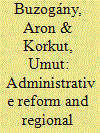

|
|
|
|
|
| Publication |
2013.
|
| Summary/Abstract |
Starting from the empirical observation of high levels of absorption of EU cohesion funds but strikingly low levels of substantive change in regional cohesion, this essay offers a contextual analysis of regional development policies in Hungary. Based on theoretical frameworks dealing with Europeanisation, new regionalism and participative development, it explores the reasons for this observation by analysing the role of administrative and planning structures and of development discourses. The essay shows that the Europeanisation of regional development policy triggered several changes in the planning process and led to the partial inclusion of new actors. However, the main effect of this was a growing centralisation of development policy making. The essay explains this by pointing to the domestic political context and the historical foundations of regional development discourses of the conservative and leftist liberal parties. While there are overlaps between the discourses on both sides of the ideological divide, they are perceived as incompatible by political actors. Thus, it is argued that considerations of political power, rather than ideological nature, shape Hungarian regional and development policy and explain the incremental reform process.
|
|
|
|
|
|
|
|
|
|
|
|
|
|
|
|
| 2 |
ID:
147688
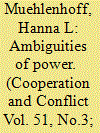

|
|
|
|
|
| Summary/Abstract |
Traditional definitions of power assume a unidirectional and coercive relationship between two actors. The debate about power in International Relations has questioned such a compulsive unidirectionality by pointing to the multidimensionality of power, as well as to the power of those who are traditionally seen at the receiving end. It is especially the latter aspect that has not been taken up seriously by empirical analyses. Moreover, research has ignored the complex power struggles the ‘receiving’ actors are engaged in and their possibility of resistance. If taken into account, these Foucauldian revisions of the concept of power allow us to analyse the development of the relationship between Turkey and the European Union (EU) since the turn of the millennium in a much more nuanced way than is often done in the existing Europeanisation literature. This case is particularly interesting, firstly because of the change in relations between the EU and Turkey, questioning the condition of a credible membership perspective under which the traditional form of power of the EU over its neighbourhood becomes effective. It secondly shows that the EU’s power extends much beyond the imposition of policy changes and has restructuring effects on society as a whole, while domestic actors are by no means passive recipients in this process.
|
|
|
|
|
|
|
|
|
|
|
|
|
|
|
|
| 3 |
ID:
177044
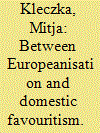

|
|
|
|
|
| Summary/Abstract |
Germany’s export-oriented defence industry, like most other “large” European producers, aims to maintain its “key” capabilities whilst the scope for national approaches narrows further. Given the rising economic and security challenges, it appears likely that Europeanisation will gradually proceed.
|
|
|
|
|
|
|
|
|
|
|
|
|
|
|
|
| 4 |
ID:
103739
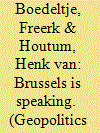

|
|
|
|
|
| Publication |
2011.
|
| Summary/Abstract |
The European Neighbourhood Policy (ENP) was presented as the EU's strategic response in order to deal with the new situation following the enlargement of the European Union in 2004. According to the EU, these changing circumstances have led to new rationales: 1) coping with its new external borders and neighbours and 2), finding a solution for a further enlargement problem. Both rationales are drawn out of strategic interest avoiding potentially damaging consequences on stability and development. Moreover, new inducements for multilevel cooperation were seen as necessary in order to 'include' the neighbouring states and create a prosperous and stable 'Ring of friends'. The ENP has the objective to contribute to internal transformation and to further the process of 'Europeanisation'. Europeanisation is explained by the EU as a normative process of sharing European values made concrete through policies of conditionality and socialisation of neighbouring states. This process of expanding 'Europeanisation' beyond the EU borders is inspired by an ambiguous and conflicting geopolitics that the EU applies as a strategic instrument. Most notably, this is emphasised by the fact that the ENP on the one hand creates an image of an inferior neighbour that urgently needs to move towards European standards and on the other hand produces a speech politics of mutuality and dialogue.
Through the study of EU speeches, communications and documents, we will argue that the rationales behind the ENP suggest a closure of the European Union and allow for neo-colonial interpretations by which pre-defined policies are to be accepted and pre-defined European values are seen as superior to neighbouring local values. This development is both undesirable and harmful. Europe is increasingly re-created as a bounded political entity institutionalised through hierarchical treaties and acts with friends, special friends, and reluctant, unwilling neighbours. In doing so, the EU faces a significant chance of alienating its neighbours and damaging cultures and societies by asymmetrical imperial power-policies based on self-created values. Paradoxically then, ENP that was set up to create good neighbours, risks producing what it wishes to protect from, angry neighbours.
|
|
|
|
|
|
|
|
|
|
|
|
|
|
|
|
| 5 |
ID:
131149


|
|
|
|
|
| Publication |
2014.
|
| Summary/Abstract |
The paper looks at the European Union's impact on corruption in Slovakia, both before and after the country's accession to the European Union. It shows that even though pre-accession channels of influence diminish or disappear, membership brings new means of influence. Our methodology looks beyond institutional changes and explicit anti-corruption mechanisms. Before 1999, the European Union's influence on corruption was close to zero, and between 1999 and 2004, its influence was strong and positive. Post-accession developments are more ambiguous, but despite an apparent worsening of corruption after 2004, we observe a transformation rather than a loss of European Union influence.
|
|
|
|
|
|
|
|
|
|
|
|
|
|
|
|
| 6 |
ID:
127077
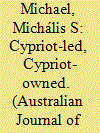

|
|
|
|
|
| Publication |
2013.
|
| Summary/Abstract |
Cyprus occupies an unenviable position among a group of intractable international conflicts which transcend their national borders and whose resolution has eluded third-party mediation. The Cyprus dispute has preoccupied theorists and practitioners of conflict resolution ever since the United Nations stationed its peacekeeping force on the island in 1964. Even attempts by the United Nations to revitalise the Cyprus talks following the 2004 referendum on the Annan plan have not yielded satisfactory results. For decades, the Cyprus problem has challenged conventional international analysis and defied traditional approaches to negotiation and peacemaking. This article grapples with the question of why this conflict has not been resolved despite endless negotiations. By extrapolating three seemingly distinct variables-Cypriotisation, Europeanisation and post-Kemalism-this article alludes to changes in the conflict's contextual parameters that are conducive to a political settlement.
|
|
|
|
|
|
|
|
|
|
|
|
|
|
|
|
| 7 |
ID:
169219
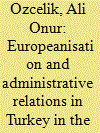

|
|
|
|
|
| Summary/Abstract |
After the Helsinki Summit of 1999, Turkey faced the impact of Europeanisation in the context of regional policy and structural funds. This impact challenged the long-established statist tradition of the Turkish administrative structure and led to the need for reforms in order to bring its regional policy in line with European Union (EU) standards. The polity effect of Europeanisation in Turkey in the post-Helsinki era has been a change in administrative relations between three different territorial tiers: supranational, national and subnational.
|
|
|
|
|
|
|
|
|
|
|
|
|
|
|
|
| 8 |
ID:
082474
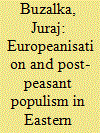

|
|
|
|
|
| Publication |
2008.
|
| Summary/Abstract |
On the basis of an examination of rural social structure, traditionalist narratives and an agrarian imaginary resulting from uneven development, this article investigates the forms of political mobilisation which materialise in East European politics as 'post-peasant populism'. Focusing on grassroots mobilisation, an analysis of the annual Corpus Christi ritual in the city of Przemy?l, south-east Poland, serves as the basis for an exploration of the theme of socially sensitive post-peasant populism as an alternative to post-socialist capitalism. This populism relies on the politicisation of the rural past and is currently influenced by 'Europeanisation'
|
|
|
|
|
|
|
|
|
|
|
|
|
|
|
|
| 9 |
ID:
095278
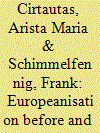

|
|
|
|
|
| Publication |
2010.
|
| Summary/Abstract |
This introductory essay reviews the literature on historical legacies in the post-communist area and relates it to the study of enlargement and Europeanisation. The authors develop a framework for the special section, specify various ways in which historical legacies can be conceived of affecting conditionality and compliance, give an overview of the contributions and summarise the findings.
|
|
|
|
|
|
|
|
|
|
|
|
|
|
|
|
| 10 |
ID:
093723
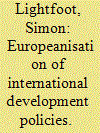

|
|
|
|
|
| Publication |
2010.
|
| Summary/Abstract |
This article examines the EU's role in the emergence of international development policy in the 10 member states from Central and Eastern Europe (CEE). Development policy provides useful insights into policy making as it is a key way that states operationalise their foreign policy. Thus, development policy gives us insights into the foreign policy priorities of the new member states. This article reviews the emergence and elaboration of policy relating to international development in the new member states and explores how far we have witnessed the Europeanisation of development cooperation in CEE states.
|
|
|
|
|
|
|
|
|
|
|
|
|
|
|
|
| 11 |
ID:
172508
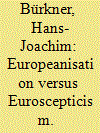

|
|
|
|
|
| Summary/Abstract |
Several overlapping crises which affected the EU during the past ten years have recently aggravated. Especially the progressing refugee crisis, the persisting financial crisis and geopolitical turmoil in the EU’s neighbourhood contributed to the rise of anti-EU movements and diverse articulations of Euroscepticism. Although public opinion and mainstream political analysis have easily identified right-wing populism as one of the most important drivers, it is still doubtful if it can be equated with Euroscepticism without further ado. To date it is by no means clear how and where Euroscepticism exactly originates.
|
|
|
|
|
|
|
|
|
|
|
|
|
|
|
|
| 12 |
ID:
114214
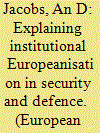

|
|
|
|
|
| Publication |
2012.
|
| Summary/Abstract |
Participating in EU crisis management operations has affected institutional actors on various levels. As the main deliverers of civilian and military resources to EU operations, national ministries and agencies have been particularly confronted with the need for administrative adaptation. A big member state like Germany is expected to make substantial contributions, but it also faces a rigid administration. This article uses a combined hypothesis of historical institutionalism and organisational learning to explain administrative Europeanisation in German government institutions involved in civilian and military crisis management deployments. The empirical data on the German administrative trajectories under Schröder and Merkel show an explanatory link between political learning and overcoming institutional path dependency.
|
|
|
|
|
|
|
|
|
|
|
|
|
|
|
|
| 13 |
ID:
120677
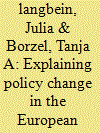

|
|
|
|
|
| Publication |
2013.
|
| Summary/Abstract |
This Introduction discusses the conventional wisdoms dominating the scholarship on policy change in the EU's Eastern neighbourhood countries and summarises the major findings of this collection. Drawing upon the empirical evidence underpinning the contributions to our collection, we argue that compliance with or convergence to EU policies happens despite high costs, limited capacities and the lack of EU membership prospects. We also challenge country-level or policy-type explanations that emphasise membership aspirations, asymmetric interdependencies between the EU and the neighbourhood countries, or the level of politicisation or institutionalisation characterising particular policy fields. Finally, our findings point towards important differences between membership, accession and neighbourhood Europeanisation by stressing factors mediating the EU's impact on policy change in the Eastern neighbourhood countries that played a rather marginal role in domestic policy change in EU member states and accession countries.
|
|
|
|
|
|
|
|
|
|
|
|
|
|
|
|
| 14 |
ID:
080075
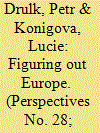

|
|
|
| 15 |
ID:
165742
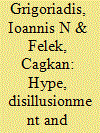

|
|
|
|
|
| Summary/Abstract |
Since the failed 2004 Annan Plan referendum, a special relationship between the Turkish Cypriot community and the EU institutions has been established. Increased unofficial contacts have paved the way for a reinforced role of sub-state actors, including Turkish Cypriot media. The role of the Turkish Cypriot media in shaping public opinion towards the EU has been largely correlated with the course of the Cyprus negotiations. Weak institutionalisation has negatively affected the influence of the local media on advancing the sui generis relationship between the Turkish Cypriot community and the European Union, as well as Europeanisation in the northern part of Cyprus. This article applies the theoretical framework of horizontal and vertical Europeanisation to explore the impact of local media on the relations between the European Union and the Turkish Cypriot community.
|
|
|
|
|
|
|
|
|
|
|
|
|
|
|
|
| 16 |
ID:
095083
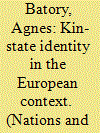

|
|
|
|
|
| Publication |
2010.
|
| Summary/Abstract |
The broad objective of this article is to explore the interaction between nationalism and Europeanisation, and the impact of this interaction on constitutionalism at the level of EU member states, using Hungary as a case study. The country reasserted its identity as a kin-state after regime change in 1990, with the relationship between ethnicity/national identity and political community repeatedly taking centre stage in political life and in the field of citizenship legislation. At the same time, the country actively pursued integration into the EU, including a constitutional amendment allowing accession. Despite the potential implications of joining a supranational political entity for the definition of political community, the two parallel processes remained largely disconnected in the political discourse and the broader debate on constitutionalism in the EU has found less resonance in domestic politics than controversy over citizenship and national identity.
|
|
|
|
|
|
|
|
|
|
|
|
|
|
|
|
| 17 |
ID:
148132
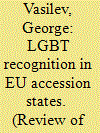

|
|
|
|
|
| Summary/Abstract |
In the EU accession literature, there is a tendency to downplay the role of discourse in facilitating norm diffusion, particularly when domestic resistance towards European norms is strong. The assumptions in this thinking are that critical deliberations and civil society activism simply lack the potency required to elicit norm conforming behaviour in accession states and that the only realistic hope for achieving this rests with the introduction of material incentives that make the costs of normative adaptation lower than its rewards. I focus on developments in the field of LGBT politics to challenge these assumptions and to specify the conditions under which discursive strategies are likely to stimulate the domestic uptake of contentious norms. I highlight shared identity as a crucial factor in the success of discursive influence, contending that under conditions of identity convergence, a cultural environment prevails in which norm promoters can more effectively ignite a process of deliberative reflection, shame norm-violators into conformance and cultivate resonance around controversial ideas. I develop these arguments through an analysis of LGBT and accession politics in Croatia and Serbia, contending that Croatia’s strong identification with Europe accelerated LGBT recognition there while Serbia’s relatively weaker identification with Europe slowed it down.
|
|
|
|
|
|
|
|
|
|
|
|
|
|
|
|
| 18 |
ID:
187357
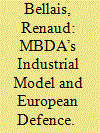

|
|
|
|
|
| Summary/Abstract |
Among European arms producers, MBDA represents the most advanced example of industrial integration and cross-border specialisation, thanks to a unique model of French–British centres of competence. However, it constitutes an exception inside the European defence technological and industrial base. It is therefore relevant to analyse why MBDA was able to achieve such consolidation process from fragmented competences of the European missile industry and to merge once competing companies despite the lack of a unique regulatory framework at the European level. This article presents the main features of MBDA today. It analyses the consolidation process in the European missile industry that created MBDA. It underlines how cooperative programmes provided a critical impulse in favour of industrial consolidation and the specialisation of MBDA sites across Europe. It explains how technological and industrial assets were reshuffled across European borders. It focuses on exports as a key dimension for MBDA’s model. Finally, it concludes by exploring the limits that result from the lack of a unified regulatory framework in Europe.
|
|
|
|
|
|
|
|
|
|
|
|
|
|
|
|
| 19 |
ID:
080077


|
|
|
| 20 |
ID:
168956
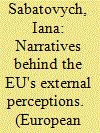

|
|
|
|
|
| Summary/Abstract |
The EU's normative promotion is a keystone in the arch of its Foreign and Security Policy, reflected in establishing a “ring of friends” in its neighbourhood. However, the EU's normative impact in these countries is often hindered by domestic constraints. Conversely, deeper socialisation through persuasion and “learning” may advance towards the promotion of EU norms better. By tracing the “learning” component of the EU's external perceptions in its Eastern (Ukraine) and Southern (Israel and Palestine) neighbourhoods, this paper elaborates upon the receptiveness of EU norms. Considering the specific attention that the ENP draws towards the support of civil society, this paper focuses on “learning” narratives of EU norms among civil society elites in Ukraine, Israel and Palestine as the key targets of EU assistance – with a particular focus on various conceptualisations of learning in the learning process. Notwithstanding perceptions of the EU as a normative power, we find that the learning processes remain too complex to be captured within a single theoretical framework. Whereas communicative rationality implies learning about each other's identities through rational arguing, our analysis demonstrates that identity performance is one of the most emotive and crucial factors in perceptions of learning.
|
|
|
|
|
|
|
|
|
|
|
|
|
|
|
|
|
|
|
|
|